#sexism in society today
Text
528 notes
·
View notes
Text
They did not "take away" Sokka sexism in the Netflix Avatar The last Airbender adaptation!l. They just made it more realistic to what sexism actually looks like in the real world.
In the original cartoon, Sokka's sexism is very one dimensional, a "women can't fight!!" attitude and he immediately gets humbled and learns he's wrong. It's a pretty simple depiction of misogyny, but it's good because after all, ATLA is a show for kids (that doesn't mean you can't enjoy it as an adult) but having a simple depiction of sexism = bad is perfect for what the show is.
However, it's very clear the Netflix adaptation is a bit more mature in tone and takes its themes a bit more serious. Its still "all ages" but I would not show it to young kids with the whole burning people alive stuff. So because it takes a more serious approach to the story, it also does so with Sokka's sexism arc! Instead of just being like "women can't fight!" he assumes by virtue of being a male who was handed a club, he is the equal of Suki and the Kyoshi warriors. He literally says this, that he thinks they are practically the same. Suki rightfully gets pissed about it! She has trained her entire life as an elite warrior. Him and her are NOT the same. And in this version, Sokka again, gets immediately humbled and learns he was wrong.
This version of sexism is waaaaay more accurate to the sexism we see around in modern society today though. We don't really see a ton of people saying women can't play sports, but that there's a lot of men who think just because they played a sport in highschool, they could match up equally with (or even beat!) a professional woman athlete. All just because they are a guy!!! And this is the sexism that Sokka exhibits, and is refuted! It's a GOOD change because it's showing sexism (and how wrong it is) in the subtle way it is more likely to show up as in the real world!
997 notes
·
View notes
Text
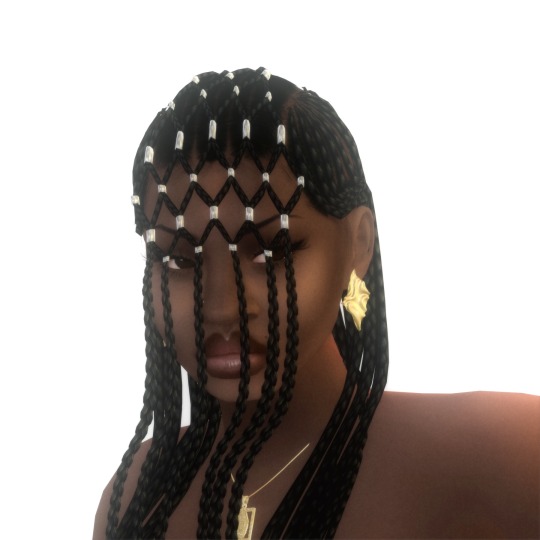
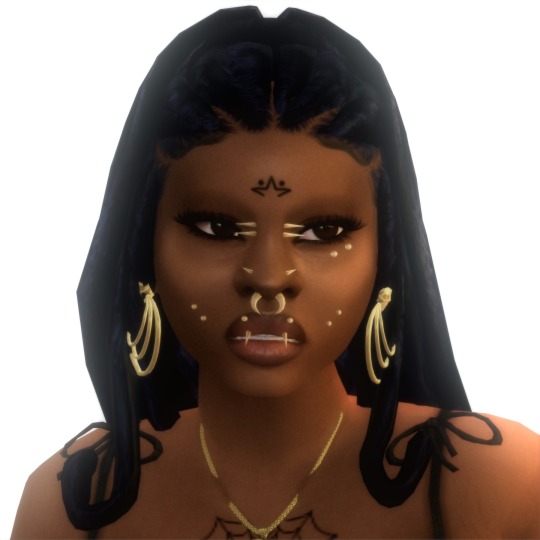
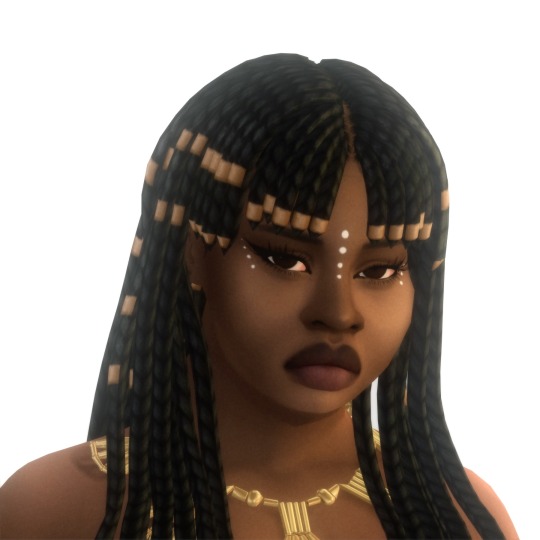
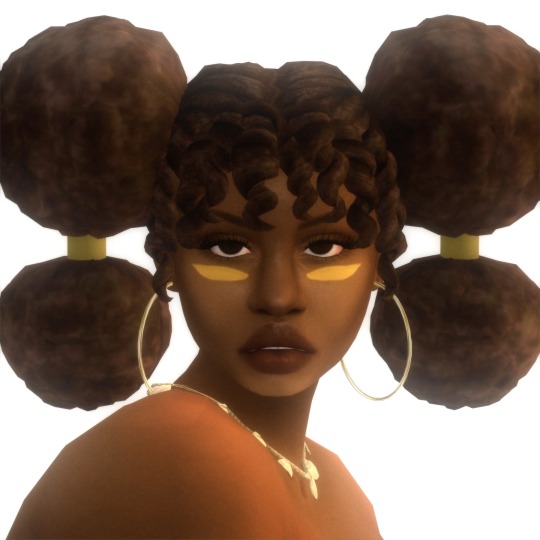
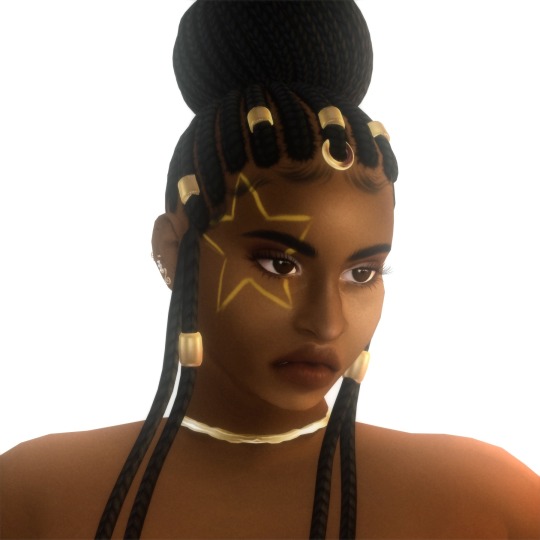
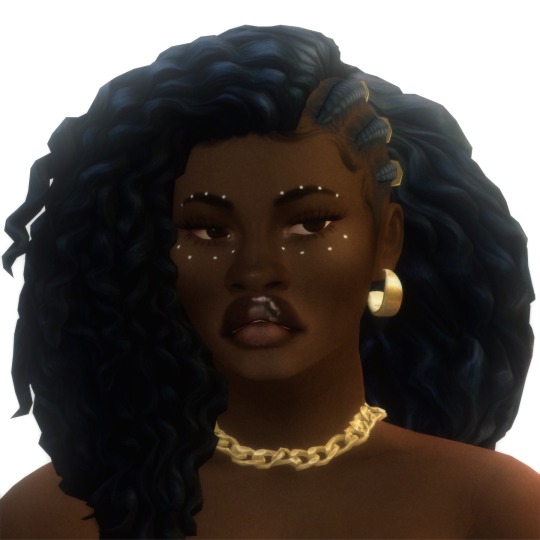
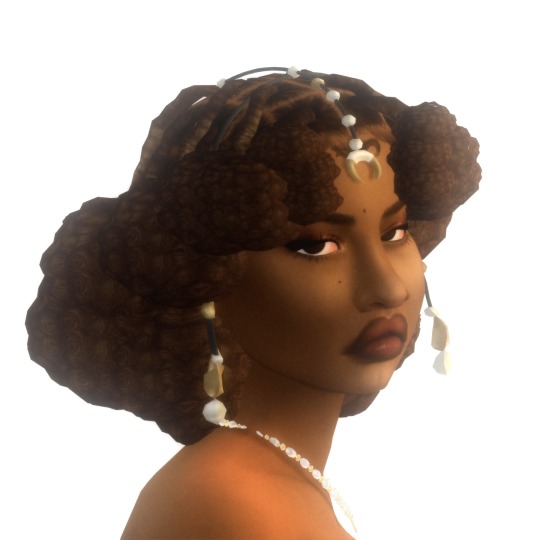
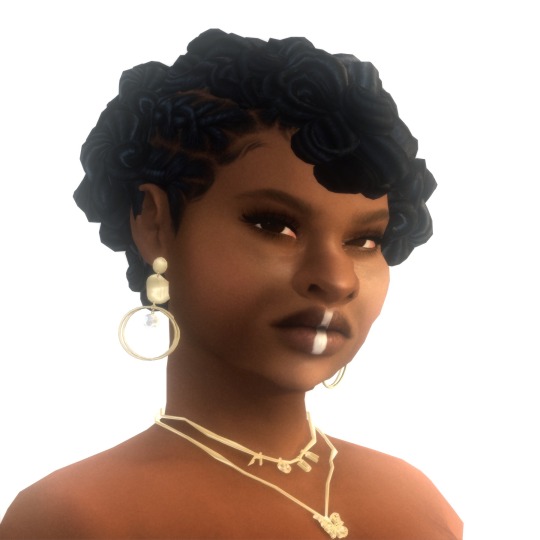
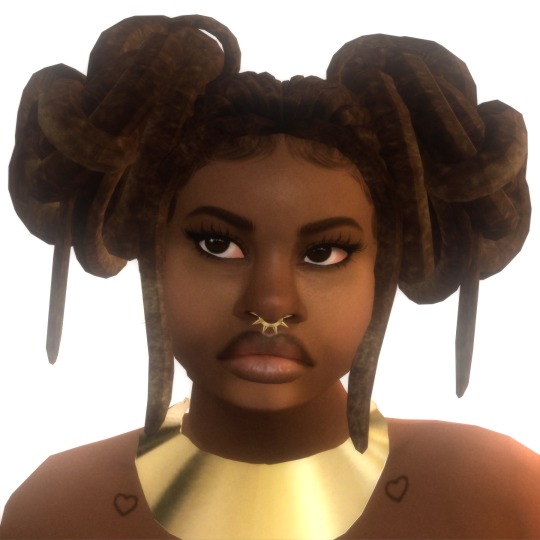
afrofuturism🪐
☆ one ~ solange hair by darknightt (tsr warning) ☆ two ~ loretta hair by @simtric ☆ three ~ bahati braids by @sheabuttyr ☆ four ~ isonoe hair by octetsica ☆ five ~ binah braids by @sheabuttyr ☆ six ~ cornrows & curls hair by @leeleesims1 ☆ seven ~ indie hair by @sashima ☆ eight ~ loc petals by @shespeakssimlish ☆ nine ~ mnemosyne hair by octetsica ☆
mini dedication essay to black simmers and ts4 creators below! pls read if you have the chance! <3
this edit is a small homage to afrofuturism and the various unique black hairstyles (and especially the black creators of most of these hairs) that i have downloaded and admired over the years! some of these are old and some of these are new.
to me, afrofuturism means constantly honoring/reclaiming/challenging the past while constantly creating/dreaming of a better society/world/future. a society/world/future that embraces and empowers all of our differences, ingenuity, aspirations, and unique lived/cultural experiences. a society/world/future that does not limit us through the various systems of marginalization and oppression (racism, homophobia, transphobia, fatphobia, sexism, xenophobia, ableism, classism, colorism, etc.) that often affects how we, as black people, live today.
blackness is so diverse and intricate yet it's always been a struggle to find my culture within a game that's known for being so limiting, bland, and extremely eurocentric when it comes to hairstyles, clothing, food traditions/events, etc. black simmers have always had to figure out how to make this game more inclusive and make it resemble either more like how our ancestors lived, how our current lives are, or how we would want our lives (and even our children's lives) to look like in the future no matter how dystopian the real world look and feel now. fortunately, these hairs and their uniqueness bring a huge sense of culture and style to this game. they have always inspired me and made me feel extremely proud to a part of the lovely african diaspora (and the ever-growing black simmer community).
in a way, being a black simmer and cc creator usually means that we are often digitally creating our own worlds as afrofuturists to varying degrees (whether we know it or not) every time we open our game, make our sims, make houses, and/or make black cultural cc. also, now i know that cc making is not easy to do and is extremely time-consuming so this post is also just me giving all black cc creators especially those who create for free their well-deserved flowers! here are some other black cc creators who created cc that have greatly impacted my game since i first started playing sims 4: @/leeleesims1 @/simtric @/hi-land @/yuyulie @/sims4bradshaw @/ebonixsims @/xmiramira @/sheabuttyr @/qwertysims @/oplerims @/sleepingsims @/shespeakssimlish and so many more im forgetting probably (im too shy rn to tag ppl but i greatly appreciate y’all fr i hope y’all telepathically get this message somehow 😭).
last but not least, i am hoping that this inspires somebody to keep creating or start creating regardless of what they think their skill level is! somebody will absolutely fall in love with your work and/or your art/work will 100% change someone's game forever <333
#ts4#sims 4#the sims 4#black simblr#black simmer#ts4 edit#🪐#🪐 black hair#soleil jones#xolani souza de oliveira#angela evans#leona morrison#chantelle diang#ayesha solomon#nylah rivers#something to end black history month with!#i really hope my essay make sense 😭😭😭#i planned to this last year but hated the pictures i took so i scraped it and redid it#i couldn’t thank enough to all the black cc creators before me and hope to help/inspire new black cc creators 🙏🏾#this is also kinda the updated version of my for the culture post…i made sure to include some familiar (but updated) faces 😭☝🏾💗🙈
697 notes
·
View notes
Text

This is who you really are and you're ready to move forward with your true interests. (P.S. If you're a trans girl and are struggling to accept your shifting interest in men, this may be for you. However, this is not meant to be a "sissy caption". I don't like doing that kind of shit.)
Late Flashback Friday post... posted on a Sunday. Anyways, I had this caption finished just today and I wanted to post it for a reason: straight trans women exist. Unfortunately, there doesn't seem to be much acknowledgement to them either because they are outnumbered by trans girls of other sexualities or because straight trans girls assimilate with the rest of society. The latter reason isn't without problems either as they also face sexism and transphobia from cisgender men who view them as "crossdressers", "traps", or "sissies"*. Then, there's the chasers who only go out with them to fulfill their "dirty little secret".
As of me writing this, I'm so glad there's a subreddit of straight trans girls who support one another and talk about their problems and solutions as embracing your shifting sexuality and interests can be challenging for anyone transitioning. The caption here isn't meant to persuade you into a straight girl who lusts for men. It's meant to support those trans girls who are realizing they're only attracted to men, but are afraid to accept their change. If your sexuality suddenly shifts, don't be afraid to accept it. Try it out and find out if it feels so right for you. It's part of your journey of transitioning into a woman. At the end of the day, straight trans women are also women and should be respected as such.
*P.S. To the sissies viewing this caption and reading this post, you are welcome to like this post and reblog it if your like. However, I ask you to please refrain from using hashtags like "feminine sissy", "faggot sissy". "cocksucker sissy" or whatever explicit tags you guys use to share with other blogs. Straight trans girls are not gay or lesbians, much less a sissy. They do not automatically turn into girls after having action with men. They have always been women inside.
303 notes
·
View notes
Text
maaaaaaan fuck humans and their society. got cat called today. Like why tf is this only a problem in human society. aswell as like sexism,racism,homophobia,transphobia,abelism etc are all like human created shit. like never had to deal with any bigotry until i was shoved in this god awful human body. *sigh* human societies and systems are like the exact definition of morosis
#alterhuman#nonhuman#therian#therian community#otherkin community#alterhumanity#nonhuman community#physically nonhuman#holothere
115 notes
·
View notes
Text

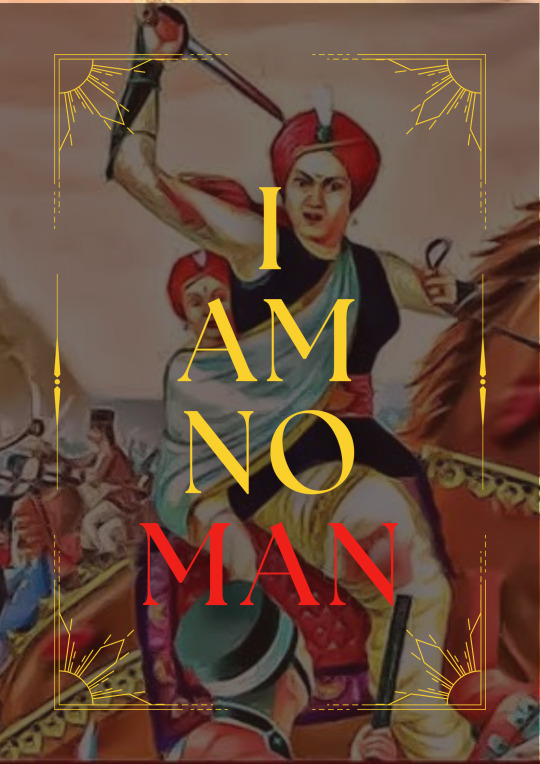
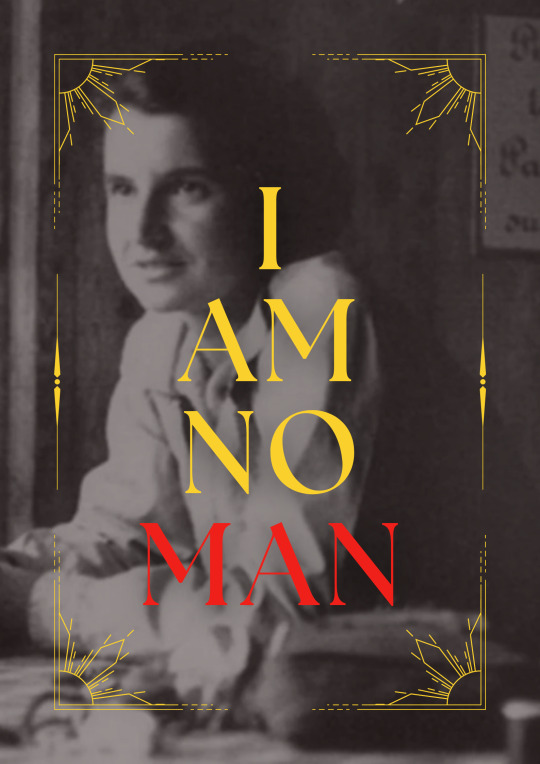



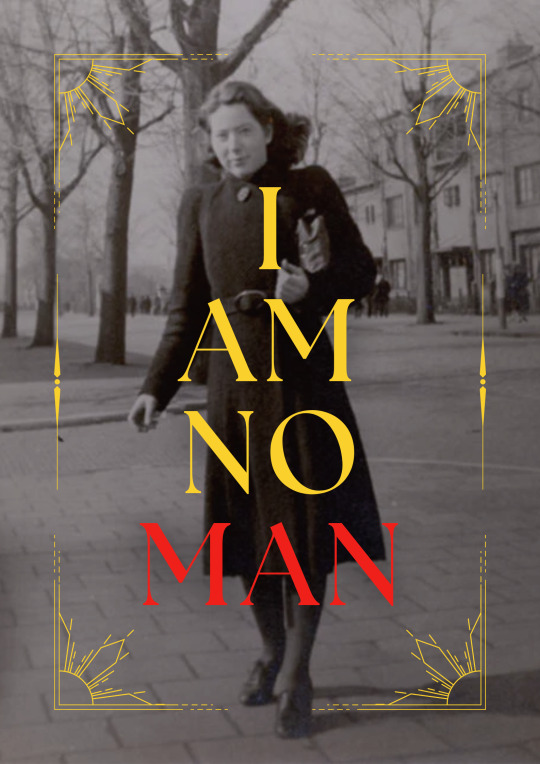

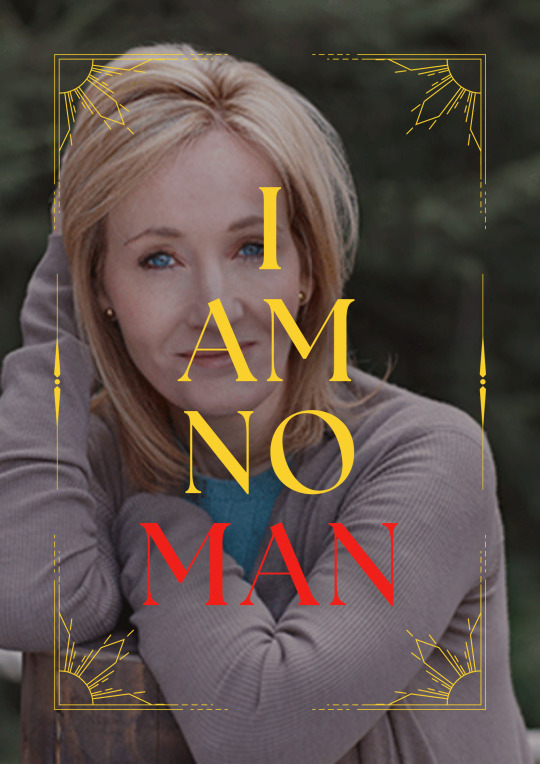
Throughout history, women have left an undeniable impact on society with their hard work, creativity, and dedication to progress. Unfortunately, their accomplishments have often gone unnoticed, been undervalued, or even stolen. Despite these challenges, brave women of today continue to push boundaries, break barriers, and pave the way for a more fair and equal world. It's our duty to keep going, so that future generations of women can inherit a kinder, more just, and supportive world. By following in the footsteps of the incredible women who came before us, we can create a world where every woman can flourish and succeed, and where their contributions are recognized and celebrated.
Joan of Arc is a patron saint of France, honored as a defender of the French nation for her role in the siege of Orléans and her insistence on the coronation of Charles VII of France during the Hundred Years' War. Claiming to be acting under divine guidance, she became a military leader who transcended gender roles and gained recognition as a savior of France. She was put on trial by Bishop Pierre Cauchon on accusations of heresy, which included blaspheming by wearing men's clothes, acting upon visions that were demonic, and refusing to submit her words and deeds to the judgment of the church. She was declared guilty and burned at the stake on 30 May 1431, aged about nineteen.
Rani Lakshmibai was the Maharani consort of the princely state of Jhansi from 1843 to 1853. She was one of the leading figures in the Indian Rebellion of 1857 became a symbol of resistance to the British rule in India for Indian nationalists. When the Maharaja died in 1853, the British East India Company under Governor-General Lord Dalhousie refused to recognize the claim of his adpoted heir and annexed Jhansi under the Doctrine of Lapse. She rode into battle with her infant son strapped to her back, and died in June 1858 after being mortally wounded during the British counterattack at Gwalior.
Rosalind Franklin was a British chemist and X-ray crystallographer whose work was instrumental in the discovery of the structure of DNA. Her contributions were largely overlooked by her male colleagues, James Watson and Francis Crick, who used her data without her permission or acknowledgement. This theft of her intellectual property and erasure of her contributions is a prime example of the systemic sexism that has historically plagued the scientific community.
Hedy Lamarr was an Austrian-American actress and inventor who co-invented a frequency-hopping spread spectrum technology during World War II that was used to guide torpedoes. However, her contributions were largely ignored and dismissed by male engineers and the military at the time. It was only later in life that she received recognition for her scientific achievements.
Emma Weyant is an American competitive swimmer. She was the US national champion at the individual medley. She qualified for the 2020 Olympic Games in the 400m individual medley and won the silver medal in this event. Weyant finished second in the 500-yard freestyle at the 2022 NCAA Division I Women's Swimming and Diving Championships. She was beaten by William (Lia) Thomas, a fetishist, who when competing as a member of the Penn men's team, which was 2018-19, ranked 554th in the 200 freestyle, 65th in the 500 freestyle and 32nd in the 1650 freestyle. Weyant is the fastest swimmer in the 500-yard freestyle and had her position stolen by a man.
Maryna Viazovska is a Ukrainian mathematician who made a breakthrough in sphere packing, solving the centuries-old mathematical problem known as the densest packing of spheres in dimensions 8 and 24. She was awarded the Fields Medal in July 2022, making her the second woman (after Maryam Mirzakhani), the second person born in the Ukrainian SSR and the first with a degree from a Ukrainian university to ever receive it.
Hannie Schaft was a Dutch resistance fighter during World War II who played a crucial role in the resistance movement against Nazi occupation. Schaft was a former university student who dropped out because she refused to sign a pledge of loyalty to Germany. Nazis arrested and killed her in 1945, just three weeks before the war ended in Europe. According to lore, Schaft’s last words were, “I’m a better shot,” after initially only being wounded by her executioner.
Shakuntala Devi was an Indian mathematician and mental calculator who was known as the "Human Computer" for her exceptional ability to perform complex mathematical calculations in her head. Her extraordinary abilities earned her a place in the 1982 Guinness Book of Records. Her lesser known achievement is that in 1977 she wrote what is considered to be the first book in India on homosexuality titled “The World of Homosexuals.”
J. K. Rowling is a British author and philanthropist. She wrote Harry Potter, a seven-volume children's fantasy series published from 1997 to 2007. Known for her philanthropy, she was doxxed and harassed after coming out with support for women's and gay rights in 2020. Rowling secretly donated hundreds of thousands of pounds to save 100 female lawyers and their families facing murder in Afghanistan. In 2022, she funded a women's only rape shelter in Edinburgh.
#this post was inspired by me being absolutely sick of trans activists claiming that joan of arc/rani lakshmibai/insert literally any other#strong woman#is actually a trans man#they were no man at all#women have been brave and strong and amazing throughout history#and they still are#if only you'd get your head out of your ass to take a look#radical feminism#radblr#terf#trans#misogny#i am no man
680 notes
·
View notes
Note
specifically asking why *zuko* is sexist is WILD because i can’t think of a single ATLA character that does not at some point say something that reveals how deeply they have gender roles ingrained into them. even aang is not exempt (see: ember island players). anyway i don’t even have a question i’m just baffled. do people think feminism is just “girls are strong like boys”
RIGHT. ive seen people say that zuko “has no frame of reference for sexism,” that zuko “doesn’t know what gender roles are/what misogyny is,” that zuko “is a feminist (????????),” that zuko “would be appalled by sokka’s sexism,” that zuko “respects katara and would do chores with her while aang and sokka lounge around like the lazy entitled dudebros they are,” that zuko “comes from a feminist society and thus wouldn’t understand sokka’s misogyny,” etc etc. like, the fire nation is literally a fascist nation. their patriarchy is overt and unsubtle. what is ozai if not the ultimate patriarch. as i’ve already established earlier today, zuko is far more sexist than sokka in far more insidious ways. zuko has never witnessed any examples of sokka’s sexism and never will, because sokka unlearned his bioessentialist logic in episode four. sokka has witnessed plenty examples of zuko’s sexism, including the time he suggested that sokka (a kyoshi warrior) was a little girl incapable of saving aang, and that time he referred to katara as “your sister” because he never even bothered to remember her name. zuko was raised in a palace and cannot even hammer a nail into a roof without breaking his thumb, while sokka hunted and provided for his entire village by himself for years and aang was raised in a communal society where everyone did their fair share of labor to maintain their temple because there was no class hierarchy. zuko internalized extremely rigid gender roles and attempted to embody the violent masculinity of fascism his entire adolescence. just because he is aware that azula and her friends could kill him doesn’t mean that he respects them as human beings. and just because he’s never called out for the way he patronizes, infantilizes, insults, demeans, belittles, and trivializes women doesn’t mean it isn’t present in his actions throughout the entire show. and yes even aang is kind of sexist. the way katara is framed through his pov sometimes is not great, and the way he objects to being feminized in the play is understandable (bc it’s a piece of colonial propaganda that is intentionally degrading him thru misogynistic logic) but also sort of betrays that he isn’t the perfectly enlightened being he makes himself out to be. i’m pretty sure the only character who doesn’t behave sexistly or accept a sexist status quo at some point is suki, and that’s only because she grew up on the isle of lesbos and also happens to only have an total of 5 seconds of screentime. zuko is one of the principal players in the show and also the most deeply flawed. so like, of course he is sexist as well as subscribing to imperialist, hierarchical logic in other ways. it’s soooo evident throughout his entire character arc. i mean, it’s the entire point of his character arc. but this is the “lestat is woman coded” website so idk why im even surprised at this point.
#unreachedgalaxy#asks#zuko#aang#sokka#suki#hot takes#analysis#also im sorry but bringing up lestat …. we don’t need to bring iwtv discourse into this …..
139 notes
·
View notes
Text
Is Edelgard a fascist?
So as I mentioned in a recent post, I'd like to dig in detail into the notion that Edelgard is a fascist. And also debunk said notion.
Now then, I'm going to look into the actual indicators of fascism, and not the "that character is in power and I don't like them" version we see thrown carelessly around the internet today.
It's broadly accepted today that the fourteen key signs of a fascist society are as follows:

While the exact wording can vary, these are the most common traits.
We'll start with the easiest ones first:
Corporations and labor movements don't exist in Fodlan, nor is there such a thing as private mass media, nor does Fodlan have elections (no, not even in post Azure Moon), so those can four can't be analyzed. However, given that corporations are modern-day fiefdoms and CEOs and the rich are modern-day aristocrats, it's not hard at all to imagine that Edelgard would align her interests more with the working class than the wealthy if she existed in a different kind of society.

And rampant sexism is the most obvious, "no", given Edelgard cares more about talent than what a person has between their legs.
Moving on next to the things that can be addressed with a little more detail.
Supremacy of the military: So obviously Edelgard starts a war, which makes things a bit weird here, but there's no indication the Adrestian military is given disproportionate focus in terms of funding or cultural emphasis aside from what could be reasonably expected from a country at war. Additionally, Edelgard favors diplomacy as a solution to Fodlan's relations with Almyra and Brigid, and Edelgard demonstrates a wide range of areas of focus for her future reforms between research (Linhardt, Constance), education (Ferdinand), faith (Manuela), and the arts (Dorothea), making it clear the military is just one of many tools in her reformist arsenal. 4 is a strong strong no.
Obsession with national security: This trait is more or less an obsession with external forces attempting to ruin you. Edelgard's detractors would immediately leap to her designating the Church of Seiros as a target while forgetting that the CoS is her only target. With fascism, there is always An Enemy looking to tear down society, but that isn't the case with Edelgard. She targets the CoS for very specific and demonstrable reasons, and once they're defanged she sets out making peace with former enemies abroad and at home. Her detractors would point out Hubert continuing to observe Fodlan for internal threats, but given how fragile Fodlan's internal peace would be for years following the war (rebellions would be a common issue, whether or not the Agarthans are involved), this is more of a justified concern than an obsessive rooting out of imagined agitators. 7 is another no.
Disdain for intellectuals and the arts: Several characters Edelgard forms very close support attachments with (Bernadetta, Dorothea, Manuela, Linhardt, Hanneman) are artistic types or intellectuals, and, despite what her detractors would have you believe, so 11 is another no.
Obsession with crime and punishment: Edelgard treats Varley and Aegir, people who tormented her, her loved ones, and countless others with a very even hand. While Rhea's confinement appears to be under severe circumstances (underground and likely in isolation for five years), this isn't done because Edelgard felt like being extra mean: you simply can't confine a woman who can transform into a dragon in an ordinary cell. Compare this to the Knight of Seiros's obsession with summary executions and Edelgard comes off looking very merciful. 12 is another very likely no.
Rampant cronyism and corruption: Firstly, she actively fights against corruption.
Cronyism is where her detractors will point out her giving positions of power to close friends, but the issue there is a key aspect of cronyism is that the person committing it ignores it does so without regard for the beneficiaries' qualifications.
The two characters most likely to ruffle feathers are Caspar and Bernadetta, but none of their endings imply they were incompetent at their respective positions. It's simply the nature of Fire Emblem ending cards to assume the character was highly succesfull during the war - aside from a few joke characters or poor Ilios.
That's a few more knocked out, leaving only a few left.
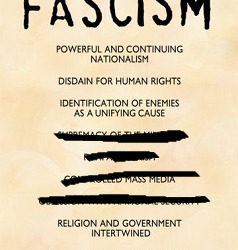
Powerful and continuing nationalism: Nationalism is the focus on the advancement of one's own country above all others. Three Houses doesn't treat Adrestia, Faerghus, and Leicester as countries, but as regions or powers, but I'll ignore that for sake of argument. Edelgard detractors claim Edelgard is focused on the advancement of specifically Adrestia, but that's certainly not true. The common anti-Edelgard claim is she's trying to regain the lands of Faerghus and Leicester for its own sake, but she isn't, she's trying to unite Fodlan so she can bring her reforms to all the continent at once.
Additionally, she's very concerned for Brigid's well-being, see her support conversations with Petra in both games, and she expresses an interest in forging better diplomatic ties with Almyra. Ultranationalism of the fascistic sort usually involves a major withdrawal of foreign relations. This is another no.
Disdain for human rights: You could argue with some justification that this is a fairly weak spot for Edelgard through her alliance with the Agarthans, and there's some merit to that. It is, however, a bit jarring to argue that the woman who wants to usher in new human rights has disdain for them.
As I mentioned previously, her treatment of Rhea during her imprisonment in Enbarr is often a sore spot with Edelgard's detractors, and it definitely seems to be the case that Rhea was imprisoned underground and largely in isolation... but again, how does one humanely secure a woman who can transform into a 30-foot flying dragon? It's just one of those things of the issues of trying to secure such an individual.
Also, as I mentioned previously, Edelgard avoids cruel and unusual punishment wherever possible, even for those who've seriously wronged her, such as Aegir. Another no, though perhaps a bit weaker than some past ones.
Identification of enemies/scapegoats:
The scapegoats part is important. As I mentioned previously, in fascist societies, there always has to be An Enemy to fight against, as fascism is obsessed with action for actions' sake and unity against some Other, all to keep the people at home from paying attention to their rights being stripped away.
So while Edelgard certainly identifies the Church of Seiros and Nabateans as a problem for Fodlan as a whole, she does this for the very clear reason of stripping their ability to interfere in the peoples' self-interests, and not just to give Fodlan an enemy to fight. Noticeably, once the church and the Nabateans are defeated in Crimson Flower, Edelgard focuses the rest of her life on social reforms. There's no indication she continues launching wars, whatever Fantasy Invader tries to say. Another no.
Religion and government intertwined:
This would seem to be Edelgard's weakest point, since she appoints one of her own ministers as head of the southern church in Scarlet Blaze. In Crimson Flower proper we have too little information on church life in Adrestia under her to know this one either way.
It's worth remembering that Edelgard's reformed system generally acknowledges the first generations of people in power will more or less be people who would have already had that power, since they're generally the most apt recipients due to their initial advantage. In that regard, the head of Adrestia's religion doubling as a government official is a problem she inherited, not one she created: Count Varley was already minister of Religious Affairs. It would be a lot more suspicious if she named Hubert the southern bishop.
Furthermore, given the nature of Edelgard's merit-based reforms, once Varley dies there's a much better chance of the next southern bishop not being tied to Adrestia's government.
Lastly, Religion and government being "merely" intertwined is an improvement from SS and VW, in which Fodlan becomes a full-on theocracy, and AM, in which religion has permanent influence over the government.

And there we go! Of the fourteen warning signs of Fascism, only one of them could be honestly tied to Edelgard, and mostly only because of her loathed alliance with the Agarthans - which she ditches in Scarlet Blaze, leaving her entirely free of human rights abuses.
So yeah, Edelgard doesn't actually look very much like a fascist when your standards are actual fascism and not, "this lady accrues power and I don't like her for it".
That's why you never take an Edelgard detractor at their word, folks.
#fire emblem three houses#fire emblem three hopes#edelgard von hresvelg#edelgard positive#edelgard discourse#fascism
79 notes
·
View notes
Text
Turtles Catches Up With Old GMMTV: The Bad Buddy Rewatch Edition, Part 3a -- BBS and Asian Cultural Touchpoints
[What’s going on here? After joining Tumblr and discovering Thai BLs through KinnPorsche in 2022, I began watching GMMTV’s new offerings -- and realized that I had a lot of history to catch up on, to appreciate the more recent works that I was delving into. From tropes to BL frameworks, what we’re watching now hails from somewhere, and I’m learning about Thai BL's history through what I’m calling the Old GMMTV Challenge (OGMMTVC). Starting with recommendations from @absolutebl on their post regarding how GMMTV is correcting for its mistakes with its shows today, I’ve made an expansive list to get me through a condensed history of essential/classic/significant Thai BLs produced by GMMTV and many other BL studios. My watchlist, pasted below, lists what I’ve watched and what’s upcoming, along with the reviews I’ve written so far. Today, I offer the first half of the third (ha!) of five posts on Bad Buddy. I'll look today at themes that myself and fellow Asian fans of Bad Buddy have caught and related to in this wonderful show.]
Links to the BBS OGMMTVC Meta Series are here: part 1, part 2, part 3a, part 3b, and part 4
As a lifelong viewer of Asian dramas, and as an Asian-American myself, I know why I'm drawn to Asian dramas. We all have our reasons for belonging to this widespread fandom, whether you're watching queer or het Asian dramas, consuming Asian music, all of it.
What are my reasons? The first and foremost one is relatability. Especially in Asian dramas, I relate to the spoken and unspoken communication of the dramatic characters as they navigate life's highs and lows. I relate to the way Asian dramatic characters engage with their families, their partners, their children, their colleagues, the world and societies around them. I relate to the ways in which societies are drawn and constructed, to the economic and emotional pressures that characters face. As an American -- I don't fully relate to the majority of experiences that white American characters face dramatically, because I'm not a part of the majority. As an Asian? I get almost all of what Asians are going through in dramatic art (save for, say, Korean or Japanese historicals, ha — but I do indeed get Asian patriarchy and sexism).
I'm not queer -- I am a cishet Asian woman -- but what I appreciate about queer Asian media is, very often, the media's tendency to not be shy about the various and intricate ways that discrimination, sexism, trauma (intergenerational, emotional, etc.), and many more social and emotional phenomena interplay in an individual's life.
When I first watched Bad Buddy, I had the strong sense that what I was watching was incredibly relatable to much of my upbringing and life as a young adult, working out issues vis à vis my family and my eventual partner. Bad Buddy, thematically, captured a tremendous amount of the realities of everyday Asian life for young people.
Bad Buddy exists in the GMMTV bubble of No Homophobia (cc @bengiyo and @lurkingshan, as we have spoken about the GMMTV bubble). However, what Bad Buddy didn't shy away from were explorations of many other social/emotional/cultural themes and frameworks of everyday life, from sexism, to youth bias, to boundaries and enmeshment, and many, many more.
I wrote in my first-ever Bad Buddy thesis that the framework of intergenerational trauma was the main theme I identified -- and identified with -- in the show. But, as I was contemplating writing this series of Bad Buddy meta posts, I wanted to know: what did my fellow Asians pick up in this show that they saw, and that they related to? In other words: what makes Bad Buddy particularly special to Asian fans of the show?
So, I did a thing. I gathered together a few BBS Asian stans, like myself, for a lengthy (and still ongoing!) discussion about what we related to in Bad Buddy. I want to thank, from the bottom of my heart, @telomeke, @grapejuicegay, @recentadultburnout, @neuroticbookworm, and @lurkingshan (who's not Asian, but has Asian relatives, and gets us!) for being up for creating a spontaneous mini-village together to talk Bad Buddy and its inherent Asianness.
It sounds redundant to identify Bad Buddy, a show made by Thais and set in Thailand, as an "Asian" or "Thai" show. It's definitely not a show that steps back to take a look at itself and say, "oh hey, this is really 'Thai,' what we're doing here." When I asked @recentadultburnout directly about what they might have identified as uniquely Thai about Bad Buddy, RAB thought about it and said -- maybe Pat's ranak ek (Thai xylophone). Other shows of Aof Noppharnach's, including He's Coming To Me, Moonlight Chicken, and even the start of Last Twilight, highlight many facets of Thai life, from the spiritual to the everyday-cultural (even Gay OK Bangkok does this a bit, too). But Bad Buddy doesn't really go there by way of overt symbolism and/or specifically Thai spiritual/cultural practice.
The Asianness of Bad Buddy is far more inherent. It is rooted and coded in the way people interact with each other.
An overt example occurs in episode 10, when Dissaya confronts Ming in the Jindapat home, and announces that she will reveal Ming's secret, dropping the effort she has made her entire life to "save face" -- her reputation AND Ming's reputation.
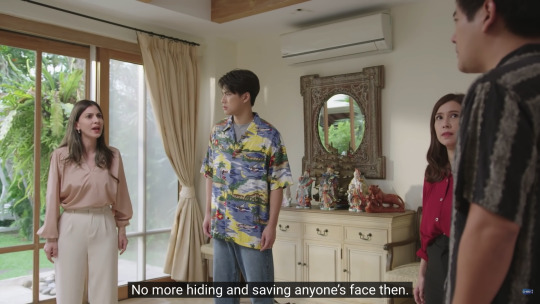
During my first Bad Buddy rewatch, I was so moved in fury by this scene that I had to blog about it as if I had never seen it before. There's so much encapsulated in this moment: the pressure that Dissaya has put on herself to keep the embarrassing secret that she lost a scholarship; the effort she made to keep Ming's theft of the scholarship a secret, to save his face, and the secrets she kept from Pran to save her face, and to keep up the façade of rivalry between the Jindapats and the Siridechawats. She was letting a whole hell of a lot loose in this moment, because the eternal pressure of saving face in Asian societies is, frankly, never-ending.
"Saving face" is an incredibly important notion in many Asian collectivist cultures. Saving face is about an individual or a family projecting an image of calm, cool collectedness and success, in order to not make waves within a collectivist society for any reason. If you are not working to seem like you are going with the flow of life, if you're not keeping up with the Joneses, the Kardashians, whoever -- you are not saving face. If you are in poverty, and are projecting an image of poverty, instead of pretending to be more wealthy than you are -- you are not saving your face or your family's face. If you allow yourself to get publicly defeated -- you are not saving face. Dissaya gave up a lot of her hard-earned reputation in the moment she confessed the truth in front of Pat and Pat's mother.
My Asian friends and I can click wordlessly into understanding the pressure of saving face; say that I didn't get good grades in school? I wouldn't be saving my parents' face. This kind of pressure to keep up with particular social dynamics within and external to family, within Asian societies, is a neverending drumbeat of pressure.
Besides saving face, there are many other Asian cultural touchpoints that were contained within Bad Buddy that my fellow Asian BBS stans and I noted. They include:
1) intergenerational/inherited trauma,
2) the unique nature of secret-keeping in Asian cultures/societies,
3) enmeshed family boundaries,
4) setting up children to compete against each other for the sake of familial pride,
5) patriarchy, sexism, and the reversal of sexism among next generations,
6) the inset/assumed roles of family members based on patriarchy and elder respect,
7) Assumed community within and external to one's family, usually based on where you live and where you go to school,
8) How one's identity is defined based on patriarchy and individualist vs. collectivist cultures,
9) How various cultures within an Asian nation live peacefully (or not) together (for example, what makes Pat and Pran different by way of Pat's Thai-Chinese heritage vs. Pran's ethnic Thai heritage),
and many, many more.
It'll be impossible, even over two posts, to analyze all of these cultural touchpoints, but a few of them engendered quite a bit of conversation among the BBS mini-village that I want to highlight. In this post, I'll focus on the continuation of my first BBS thesis on intergenerational/inherited trauma, the nature of secret-keeping in Asian societies, and will return briefly to the touchpoint of saving face.
One of the most devastating scenes for me in Bad Buddy is in my favorite episode, episode 10, when Pat (after he's learned, throughout the episode, of the extent of the lies that his and Pran's family have shared with their children) confronts his father about his father's demands to literally control Pat's emotions, the way in which Pat related to other people -- specifically Pran. Pat sums up a lifetime's worth of control in one sentence.
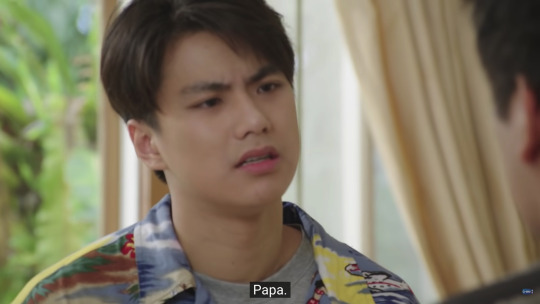
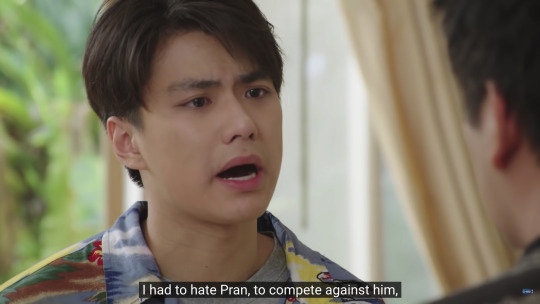
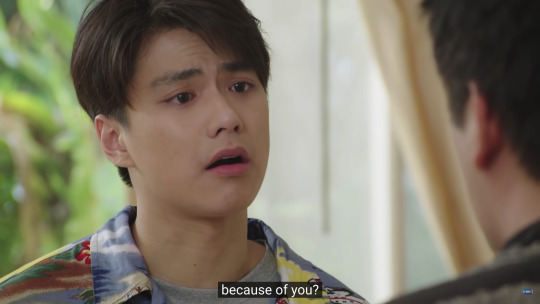
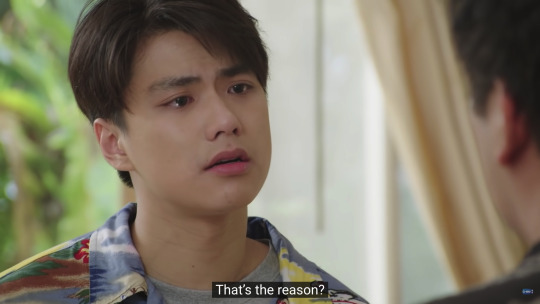
@telomeke noted in our ongoing group conversation that this notion of inherited trauma vis à vis Ming is particularly present in Asian societies, not just by way of familial expectation that we, as Asians, embody it and "take it" throughout our generations, as Pat realized up above -- but that ALL family members present are responsible for playing their roles within the framework of the inherited trauma. @telomeke noted in particular that exactly what Pat was doing to hate Pran, FOR his father? That was what Ming HAD to do for MING'S dad, when Ming schemed to get the scholarship from Dissaya. AND, Pat's mother, in consoling Pat, had to play the role of explainer -- which, as we know now, Pat ran away from to meet his beloved Pran on the rooftop before running away to the eco-village.
Pat running away from that moment? That was a huge symbol of the breaking of the inherited trauma that was given unto him by his parents both.
(@telomeke has actually written about their theory about how the Jindapats and Siridechawats ended up living next door to each other -- which seems SO STRANGE on the surface, consider Ming's and Dissaya's boiling hatred for each other -- and the theory links nicely within the framework of inherited trauma. Tel theorizes that Ming's father or grandfather may have actually gifted the house to Dissaya's family as a means of apologizing for Ming's deceit. In which case: the presence of the Siridechawats is a reminder, on an everyday basis, of Ming's folly to steal from Dissaya, which may explain why Ming in particular went so hard on Pat to triumph daily over Pran.)
We as a group unwound quite a bit on the nature of secret-keeping in Asian cultures. We know Bad Buddy relies on this cultural touchpoint at the end of the series: Pran and Pat have a full-fledged and committed relationship as a transparent secret, under the noses of Pat's and Pran's parents.
Secret-keeping....oh, man. I could not have lived a fully authentic life in America if I didn't keep a million secrets from my family while I was living out my own independent choices. I actually, literally, could not have gotten married, because the rule of my household was that I wouldn't date. I would just... get engaged. So I'd get engaged through, what, magic? Match-making? No: I'd have to find my partner through my own battle of social and familial conventions, literally against my family, to get to where I wanted to be in life, which was (gasp) married.
@neuroticbookworm illuminated more on this particularly from our shared Indian lens. She wrote,
Keeping your relationship secret from parents is sooooo ridiculously common in India (and I'm sure we can extrapolate to other Asian countries like Thailand). And the justification the children give themselves is always rooted in how they have a "duty" towards their parents, and that they will reveal their relationship after they have fulfilled their duties.
God, I LOVED that NBW brought up "duty" in this conversation. Because! Assumed within the coded language from Asian parents to children, and vice versa, is a sense that children MUST follow the dictates of their parents. 100%, full-stop.
The duties that NBW clarified in this particular conversation specified life demarcations such as "[w]hen I graduate, I'll tell my parents about my partner," and "[w]hen I graduate and get a job and can financially support myself in life, I'll tell my parents about my partner."
What's coded in these statements is a fear that the children will have to reveal to their parents that they were disobedient in the rules their parents set, that no dating shall occur until the time at which the parents rule it's okay. And at least within Indian frameworks, that period of it being "okay" is, more often than not, the period in which arranged matches are examined. Because, yes, that's still the rule in the high majority of Indian culture.
The revelation of that disobedience? That's bad-news bears. It indicates... everything: a lack of loyalty to the family; a lack of understanding the meaning of a child's role to listen to the parents as the parents are elders and therefore are the moral authority of the household; a lack of self-control (which is a huge deal -- that relates to saving face on behalf of the family); a lack of understanding the morals and ethics of saving oneself, in love and sex, before marriage, etc. Even if a family seems fully progressive on the outside, as an Asian, I'm conditioned to question that progressiveness -- as parents may hold different standards of acceptance for their children vs. other young people.
@telomeke expanded on disobedience for us -- connecting it back to the very important notion of "saving face."
I think there's something quite related to secret-keeping, but it's also to do with the ability of Asians, but also human beings in general, of being able to live with duality in life... and secret-keeping is part of it. This also ties in to the East and Southeast Asian preoccupation with the concept of "saving face" [as noted above]. A lot of families are able to live with the knowledge of dirty secrets, unsavory truths, as long as it's not brought into the light and confronted. I'm constantly reminded of this whenever I rewatch BBS Ep. 12 because it's clear both Ming and Dissaya KNOW their sons are in a relationship but it's not overtly admitted. In that way they (and more Ming I suppose) get to "save face" and not have to deal with the truth that their sons are being disobedient, consorting with the enemy, and because it's not in the open -- there is no dishonor brought to the family and to the elders.
God, I love the way Tel put this. That disobedience on the part of Pran and Pat would actually bring dishonor to their families -- because their families have put SO MUCH EFFORT into building their public AND private enmity their entire lives! It affected Chai's relationship with the families as an employee of both families. EVERYONE AT PAT'S AND PRAN'S SCHOOLS knew the guys were the "legendary rivals." And, of course, by being in rival faculties at the same university, the boys could continue this public enmity as well -- keeping up with the roles that were literally assigned to them by their parents.
If the boys disobeyed, they would bring dishonor to their families. Think about that -- and connect that with the heaviness that Pran walked away with after the rooftop kiss in episode 5, AND the weight of Pran's breakdown at the end of episode 10, when Pat assured him that they would run away together.
No matter what a Western viewer (and maybe even Asian viewers, wanting to see a dismantling of these paradigms) would want Pat and Pran to have by way of full openness of their relationships with everyone in their lives (because, in individualistic cultures, that self-driven openness is a given), Pran and Pat themselves knew that that couldn't be their reality vis à vis the social worlds they belonged to. So they kept their relationship a secret, in the end.
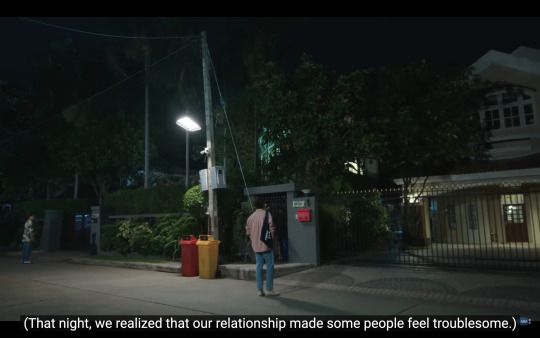
The secret that Pran and Pat keep about their relationship is strategic. It's certainly also a stress point: an older Pat asks an older Pran, at the end of episode 12, if he'll ever be able to walk through the front door of the Siridechawat house.
But this is the compromise -- within the larger-scale culture of secret-keeping in Asian societies, AND the private frameworks of the enmity that Dissaya and Ming established between themselves and their families years and years prior -- that will work best for Pat and Pran to preserve the sanctity of their relationship, which I talked about in part 2 of this meta series.
Pran and Pat do not have to publicly appear disobedient to the demands and pressures of their families. They do not have to make their families engage with each other. They do not have to make their families confront the mistakes that their parents made earlier in their lives. They can protect their families from their private and public follies. They can help their families keep and save face. And by doing all that? They can prevent their relationship from being threatened.
I feel this very deeply in my heart as an Asian-American. For the sake of my American spouse, I wanted to protect him from a lot of these pressures, and so I insisted on keeping a lot of our relationship secret from my folks. If I demanded full-blown, public acceptance from my parents? If I brought my "boyfriend" to parties, and introduced him as such with aunties and uncles -- especially if it wasn't indicated that we'd be permanent one day? Damn. No. I'd be embarrassing my folks, with the aunties and uncles saying to my folks, "dang, you can't control your daughter, huh? You let her do what she wants." That would mean my parents would lose face over their ability to control the lives of their children, and that's no bueno in our cultural terms. It would be on ME, as THEIR child, to uphold THEIR ability to save face, as much as its their own work.
Dissaya refers DIRECTLY to Pran doing this FOR HER when, in episode 10, she asks him, "did you forget to save my reputation?" It's brutal, daily work. And Pran goes BACK to keeping secrets in the end, because it would have been impossible, ultimately, for Dissaya to save face, AND for Pran to save Dissaya's reputation/face, if Pran were out with his relationship with Pat, thus proving his disobedience. It would be -- JUST -- better to keep the secret for all those involved.
As this post has gotten long, I'm going to continue talking more about these touchpoints in a second post. I'm driven to talk about this because I think much of the Western fandom might miss what us Asians are reading into shows like Bad Buddy through this coded language and engagement. I very much posit that Bad Buddy -- while it is first and foremost a queer show, made by queer Asians, about queer young men -- is so relatable to so many of us because we've faced similar struggles of survival, and we've faced threats to the sanctity of the love we have for other people by way of needed to fit into the roles set before us by previous generations.
So! With that, thank you for reading, and see you tomorrow, when I focus on competition, enmeshed family boundaries, patriarchy and sexism in Bad Buddy, and more if I can fit it in!
(Tagging @dribs-and-drabbles, @solitaryandwandering, and @wen-kexing-apologist by request! If you'd like to be tagged, please let me know!)
[Alright! Stay tuned for more, many more ruminations from the BBS Asian station tomorrow!
Here's the status of the Old GMMTV Challenge watchlist. Tumblr's web editor loves to jack with this list, so mosey on over to this link for the very latest version!
1) The Love of Siam (2007) (movie) (review here)
2) My Bromance (2014) (movie) (review here)
3) Love Sick and Love Sick 2 (2014 and 2015) (review here)
4) Gay OK Bangkok Season 1 (2016) (a non-BL queer series directed by Jojo Tichakorn and written by Aof Noppharnach) (review here)
5) Make It Right (2016) (review here)
6) SOTUS (2016-2017) (review here)
7) Gay OK Bangkok Season 2 (2017) (a non-BL queer series directed by Jojo Tichakorn and written by Aof Noppharnach) (review here)
8) Make It Right 2 (2017) (review here)
9) Together With Me (2017) (review here)
10) SOTUS S/Our Skyy x SOTUS (2017-2018) (review here)
11) Love By Chance (2018) (review here)
12) Kiss Me Again: PeteKao cuts (2018) (no review)
13) He’s Coming To Me (2019) (review here)
14) Dark Blue Kiss (2019) and Our Skyy x Kiss Me Again (2018) (review here)
15) TharnType (2019-2020) (review here)
16) Senior Secret Love: Puppy Honey (OffGun BL cuts) (2016 and 2017) (no review)
17) Theory of Love (2019) (review here)
18) 3 Will Be Free (2019) (a non-BL and an important harbinger of things to come in 2019 and beyond re: Jojo Tichakorn pushing queer content in non-BLs) (review here)
19) Dew the Movie (2019) (review here)
20) Until We Meet Again (2019-2020) (review here) (and notes on my UWMA rewatch here)
21) 2gether (2020) and Still 2gether (2020) (review here)
22) I Told Sunset About You (2020) (review here)
23) YYY (2020, out of chronological order) (review here)
24) Manner of Death (2020-2021) (not a true BL, but a MaxTul queer/gay romance set within a genre-based show that likely influenced Not Me and KinnPorsche) (review here)
25) A Tale of Thousand Stars (2021) (review here)
26) A Tale of Thousand Stars (2021) OGMMTVC Fastest Rewatch Known To Humankind For The Sake Of Rewatching Our Skyy 2 x BBS x ATOTS (re-review here)
27) Lovely Writer (2021) (review here)
28) Last Twilight in Phuket (2021) (the mini-special before IPYTM) (review here)
29) I Promised You the Moon (2021) (review here)
30) Not Me (2021-2022) (review here)
31) Bad Buddy (2021-2022) (thesis here)
32) 55:15 Never Too Late (2021-2022) (not a BL, but a GMMTV drama that features a macro BL storyline about shipper culture and the BL industry) (review here)
33) Bad Buddy (2021-2022) and Our Skyy 2 x BBS x ATOTS (2023) OGMMTVC Rewatch (The BBS OGMMTVC Meta Series is ongoing: preamble here, part 1 here, part 2 here, more reviews to come)
34) Secret Crush On You (2022) (on pause for La Pluie)
35) KinnPorsche (2022) (tag here)
36) KinnPorsche (2022) OGMMTVC Fastest Rewatch Known To Humankind For the Sake of Re-Analyzing the KP Cultural Zeitgeist
37) The Eclipse (2022) (tag here)
38) GAP (2022-2023) (Thailand’s first GL)
39) My School President (2022-2023) and Our Skyy 2 x My School President (2023)
40) Moonlight Chicken (2023) (tag here)
41) Bed Friend (2023) (tag here)
42) Be My Favorite (2023) (tag here)
43) Wedding Plan (2023)
44) Only Friends (2023) (tag here)]
#bad buddy#bad buddy meta#bad buddy the series#bad buddy the series meta#backaof noppharnach#aof noppharnach#ohmnanon#ohm pawat#nanon korapat#patpran#pat x pran#pran x pat#the bbs ogmmtvc meta series#turtles catches up with old gmmtv#the old gmmtv challenge#ogmmtvc#turtles catches up with thai BLs#turtles catches up with the essential BLs#asian intergenerational trauma#intergenerational trauma#asian themes in bad buddy#saving face in asian cultures#asian cultural touchpoints in bad buddy
63 notes
·
View notes
Text
It’s in the accent. It’s ALL in the accent.
Izzy Hands does not represent homophobia. He is not fucking up shit because he hates femininity because sexism. He is not secretly motivated by racism. He’s a cunt, but he’s not that kind of cunt.
His accent is aggressively, unabashedly working class. I can’t directly place which specific county his accent is from, but it’s most influenced by the Northern counties. For the purposes of this analysis, there is more emphasis placed on the fact that his accent is regional, not received. The influences appear to be primarily Northern.
There is a lot of friction between the North and the South in England. Northerners do not like Southerners. Historical context: There was considerable resistance from the existing rulers and princedoms in the North of England against the Norman colonizers who essentially imported (imposed) aristocracy as we recognize it today into England. The distance from the South was further and the conditions harsher. There was less assimilation.
The invaders struggled to exert the same kind of power in the Northern countryside that they did in the South because of distance and supply lines. When conflicts did happen they were often incredibly brutal, eg. the Harrying of the North, in which the Normans slaughtered, burned, and starved the North. As much as 75% of the population was lost in an attempt to bring the North to heel.
The general perception in the North is that Southerners perceive Northerners with contempt and loathing, deliberately deride and overlook the North, and when they do take an interest it is for the explicit purpose of exploitation. Northern suffering is worth less than Southern inconvenience. Even today, a Northern accent is often synonymized with a lack of education, empathy, or intelligence, or used as the butt of a joke.
Stede and Lucius benefit from literacy, received pronunciation and a wider vocabulary. In Stede’s case this would also include multilinguality in French and Latin, a literal language barrier to either permit or deny participation in the main institutions of European and British power: the aristocracy, the courts of law, and the church. An educated accent is used in almost explicit contrast to make traditional working class dialects, gradually evolved over centuries from Old English and contact through work with other trading nations like Holland, appear embarrassing and insufficient.
Izzy, a literal pirate with a strong working class accent, has every cultural reason to loathe the posh, aristocratic, well-educated Stede and Lucius (Lucius can read and has a London accent). Femininity is not the issue here; foppish upper-class affectations are. The authority. The entitlement. The bastards that prosper because he suffers, and his parents, and their parents, and their parents. Their extravagance and theatrics are in direct contrast to the down-to-earth, masculine modesty valued by the average Geordie or Yorkshireman.
I cannot stress enough that all of Izzy’s interactions with Stede are historically British class-based grievances.
So before you twist Izzy into some fake effigy of homophobia or self-hating gay or whatever the fuck else, try to look at it from this perspective:
Izzy is losing the man he cares about most in the universe to a fucking posh bastard aristocrat. It’s not just that he hates Stede - Izzy’s position in society, dignity in his own country, and even his self-worth and the value of his own life has been constantly and forever overlooked in favor of people just like Stede Bonnet. People who are lucky, who are born lucky. And now the place that he feels he belongs, the work that he takes pride in, the life he’s cultivated and the people who matter to him, are all being co-opted apparently on a whim, for fun by the exact kind of person who has oppressed him and his ancestors for the past seven hundred years.
And frankly, I can kind of see why he’s pissed.
If you take this read of his character, he ceases entirely to be just some shallow and two-dimensional villain. He’s a character who has suffered at the hands of the privileged, entitled elite that Stede represents to a working class man. He takes out that suffering on those around him in a desperate attempt to protect his place in the world. Being second-in-command to the great Blackbeard is an enormous accomplishment that he has every reason to protect. He has a chip on his shoulder that makes him feel like he has to bite, scratch and claw for every single inch of empowerment he has.
And it makes him a rich and fascinating character! One who is tragically too damaged to accept kinship with the people he actually has so much in common with. His innate identity made him feel completely powerless, so he seeks power over others. He’s insecure and bitter. It’s tragic in a nuanced, Shakespearean sort of way.
Izzy Hands adds so much to the story, and it shows just how much thought and care went into creating each and every important character in this series - even the villain.
#izzy hands#ofmd#our flag means death#I live in Northern England#BTW#aristippus helped me with the historical elements#stede bonnet#blackbeard#edward teach#meta
1K notes
·
View notes
Note
Do you think patriarchy is an inherent part of gender? I sometimes feel like yea of course I transitioned to escape sexism because I transitioned to escape being a woman. As a society, our concept of the gender binary is built on the concept of gender hierarchy. But that also feels sort of victim blamey towards women. I would like to be able to imagine a world where women can just be women without having to experience sexism you know
well i'm no expert on womanhood but i think right now the concept of being a woman is pretty inextricably tied to patriarchy in most places in the world -- because of european and american imperialism. but it was not always that way. there are lots of other gendered frameworks throughout history and even in parts of the world today less ravaged by colonization. should we even call those other cultures' gendered identity categories "women," or their ideas about gender "ideas about womanhood," or are we imposing a european, christian understanding of things onto something so completely different as to be distorting things?
people who today are called women would have been seen differently in other cultures and moments in time, does that mean those other ways of seeing them were all still "female" genders? not necessarily... we can try to generalize across all the many gendered systems of the world but we destroy so much diversity of thought when we do.
in this world, to be a woman means to be particularly oppressed by patriarchy. but in another world are there women at all? or just other labels and social roles that are so different that using our word of "woman" completely erases who those people are or were?
38 notes
·
View notes
Note
Yeah some obssesive men can be misogynistic bc they think a girl is theirs and they shouldn'r reject them bc they are nice to them?
However i think some obsessive men would act possesive,regardless of gender and non-patriarchal ideas..
Anyways. It's hard to find smut or just one shots with yandere boys without misogynistic traits :( or if they plant the idea of one,ppl would still labeled as misogynistic.
But with female yanderes (bc sexism thinks girls can't do no wrong and aesthetic,romanticizing mental illness) they make sadistic girls look more appealing and cutesy gaze.
Like I just want enjoy my sadistic boys in peace and them to have some cutesy :(
Oh you just made me drop an essay. I have a lot of thoughts about this actually.
Tw for discussion of misogyny, rape, stalking, lots of incoherent talking too lmao
Most yandere characters in mass media are female. I have this theory that (mostly) men like yandere women in fiction because it's a reversal of the socially accepted gender dynamics where women are seen as weak, fragile or submissive. We need to take in account that the trope started in Japan where those gender roles are still very prevalent to this day, and to a male Japanese audience seeing a dangerous, powerful, dominant woman is a power fantasy. It's unusual, you know? For the "prey" to be the predator. In retro horror movies the victims are usually women while the killers are men. So it's absolutely shocking (revolutionary even) to see the roles reversed. Female stalkers, villains, obsessive women, in a way they're all reclaiming themselves in cinema and media, and allowing themselves to be possessive and jealous the way men have been for centuries IN REAL LIFE. I have nothing but respect for media that chooses to engage with that, be it horror or even romance. I think it's easier to have a nuanced discussion on female yanderes than on male because of the physical difference and the way society views criminals based on gender and appearance.
Society keeps telling us that women are to be desired, they're always the center of the desire (and objectification/sexualisation). With female yanderes this is reversed too - men get to be desired (obsessively so), they become the center of someone's sexuality, which is rarely the case in real life where male sexuality revolves about being the dominant figure in the relationship. It's a way for men to be submissive without having to face a society that emasculates and mocks them for this submissiveness. Or at least that's the way I see it. It's a very interesting topic.
With male yanderes, the conversation is entirely different. It's hard to write about them without engaging in some way with misogyny. You can't write possessive men without thinking about the very real life implications of those behaviors. 200 years ago women were still considered property, they belonged to the highest bidder. Even today hundreds of women are murdered because they reject men who can't handle rejection, or who view them as property. Of course there are cases where women kill their male partners out of jealousy or paranoia, but the reverse are much, much more common. It's very important in those topics to be able to distinguish between fiction an reality.
There is the other side of it all. Fiction is fiction. It can be anything. Fiction of course doesn't exist in a bubble, but it doesn't need to be realistic or even engage with the real world. You can have possessive men who aren't misogynistic or rapey. But I choose to look at all perspectives. I enjoy working with some realistic traits from time to time, and that often means dealing with unpleasant, sensitive real world topics like misogyny, rape, inceldom, assault, rape culture etc. I look at the yandere genre as a horror trope first, and as erotica second. I don't consider it romance - although some slight yandere traits can be used to create perfectly healthy male yandere characters, my writing isn't an example of that at all.
Those are my two cents, sorry for the rambling, but as a writer (and a feminist) I really find this topic intriguing. There are so, so many aspects to it, social, cultural, etc
71 notes
·
View notes
Note
Hi! Sorry if this ask is quite random for you to see, but is it ok to ask you that
On a scale of 1-10, how sexist and/or misogynistic would you rate the book Watership Down being?
I’m considering checking out the book, but I’m unsure whether I should do that or not due to the possible sexism within it. Thanks!
If you can't handle sexism, I would skip Watership Down. It's pretty bad in that aspect, enough that Ursula K Le Guin uses it as a major example of how misogyny expresses in xenofiction narratives.
In spite of how doe rabbits are the ones responsible for founding new warrens, the main characters are all bucks.
Does are spoken about a lot in terms of reproduction, and mostly that.
There is a massive plot point later where the all-buck party realizes they need women, and set out to get them.
There's an evil rabbit warren, and they show that this warren is evil partially because of some implied sexual assault of the does they control.
It was also written by a White British Man Of A Certain Era. It will sometimes drop a line that we find VERY racist in today's standards, particularly near the beginning where it compares the rabbit culture to... "other primitive societies."
#I think the movie and miniseries adaptations are better about it#I would rec the miniseries for you to start with#It's not FANTASTIC at totally fixing it but it does address it a little#It doesn't alter the all-buck party problem but it allows some does to be characters and play more of a role#AND it also has to maintain the 'we need women or our society will die' plot point#But it doesn't make the evil warren as... rapey I guess. To put it crassly.#Even though I like the movie better for maintaining more about how fast and brutal the life of the rabbits is#I think if you're more sensitive to darker themes the Miniseries is a good way to get the story in a more tame way#Also I heard no one likes the miniseries lmao but die mad it's Fine.#Like yeah the animation's a little jilted but it is Fine#I like some of the additions actually
32 notes
·
View notes
Text
What?! There's period typical homophobia and sexism in a BOOK SET IN ANCIENT TIMES?! SHOCK! HORROR 😱😱😱😱😱😱
Seriously though stop applying MODERN standards to historic settings in books. You just sound silly.
Learn to separate our standards from the past and you'll appreciate the characters and themes of the book better, I promise.
Unfortunate as it is, the novel's society does have what we consider today as bigoted standards. But to them, homosexuality for example, was not the norm. In MDZS, it was unusual, in fact, hence everyone other than wangxian's reactions towards it. (Even then, WWX had his own confusion and, in a sense, bigotry towards it, which I mentioned in a previous post. And that brings me back to the PERIOD TYPICAL STANDARDS of the book's setting which ALL the characters subscribed to in some way!!)
The characters are therefore acting on the morals OF THAT TIME PERIOD.
As uncomfortable as it is, stop holding characters to our standards. Oh and whilst you're at it, let people interpret characters however they like in FANON.
Would also like to add that even fanon aside, JC himself is 🏳️🌈 coded, regardless of what the author says. As such, it is completely understandable how some LGBT fans like and latch onto him and headcannon him as such.
See the jealously he has towards anyone talking to WWX and his zero interest in women. Plus his reaction to seeing WWX with LWJ and the fact he never married.....
Yeah. Makes perfect sense why LGBT headcannons of him would exist, especially if you read into how the gossipers in the book literally described his relationship with WWX.
To act as though the LGBT headcannons of him are nonsensical is, in fact, nonsensical in itself for these reasons. Just admit that you're going by your own bias towards JC and go. Because the LGBT HCs whether he be gay, bisexual, ace or a combination of some isn't as big of a reach as you think it is if you read into the character. And it explains how a lot of ace fans have latched onto his character and those still questioning their sexuality too because they may still be in an environment where it isn't safe or welcoming to come out yet (quite like the setting in MDZS).
Consider internalised homophobia exists, and can apply to some MXTX characters is all I'm saying and ultimately, let people enjoy their headcannons fs. It isn't hurting anyone. But remember that your shitty, biased opinions are!
#canon jiang cheng#jiang cheng#mo dao zu shi#mxtx mdzs#some of y'all dont deserve books#like dont read books set in ancient settings or engage in the fandom if this sort of stuff upsets you!#because youre not going to have a good time otherwise!
38 notes
·
View notes
Text
Happy New Year everyone! Today I want to show you my main setting: the Divine World. It’s a dark fantasy world that combines both epic (gods, monsters, magic, saving the world) and mundane (death, decay, bigotry, oppression) aspects of the genre. Worldbuilding and lore is a very important part of DW, to a point where if I could write everything I want about DW it would be one of the biggest books in the history of mankind. But this is an introductory post, so I’ll try to keep it brief!
1. While I’m not going to get into any unpleasant details here let’s still get some trigger warnings out of the way first. As I said DW is dark fantasy, and it’s so dark that Marena came up with the name Macabre Fantasy in order to emphasize how dark DW is and how the aforementioned themes of death and decay play a huge role in it, as well as many other sensitive topics. Aside from what has been already mentioned there's also a lot of cruelty & violence (both interpersonal & socio-political) and also topical problems: sexism, nazism, colonialism, etc. All of this, of course, is not for the sake of being edgy, but to make a lot of important points.
2. The inhabitants of the Divine World are appropriately called Divine Humans [1], aka Homo Mirandum. While they look a lot like regular humans, there are a lot of differences between us and them! They have horns, claws, different hair textures and skin tones, three spinal cords instead of one and are also bigger than us: it depends on a lot of factors and the shortest men are actually not that big, being only 166 cm tall, but the tallest women can go up to 350 cm! And yes, you’ve read it correctly, women are taller! Divine sexual dimorphism is somewhat flipped compared to ours and Divine women are tall, muscular and hairy, while men are short, thin and mostly hairless. Meanwhile their voices are pretty similar and androgynous, and also have a metal (as in material not music) vibe to them.


Physically Divine humans are, for the lack of better word, monumental: they are strong, capable of surviving wounds that would kill a regular human ten times over, have a great memory, but are also stiff and slow, both physically & mentally, for physiological reasons as well simply because they can afford to be — their lifespans can be measured in multiple Earth centuries. However Divine humans rarely enjoy their longevity to its full extent. Outside dangers aside, their illnesses and disabilities are just as monumental as they are. For example, Divine albinism means fully transparent flesh which in turn means complete blindness and high vulnerability towards radiation (levels of which are very high on Mirabilis).
Divine souls are just as physical as anything else. They are also Aetheric in nature, and are another example of Divine sexual dimorphism: white souls belong to men and black to women (with rare exceptions). This plays a huge role in Divine society and became one of the reasons why most Divine societies are patriarchal: men, despite being physically weak, can literally mind-control women when needed. It doesn’t help that too much contact with an aether opposite to your soul can lead to death.
While Divine humans are technically the only race of Mirabilis, thanks to magic they can turn into many various creatures: Demons, Angels, Chorts (lesser Demons, roughly speaking), Bieses (lesser Chorts), Beatas, Vampires, Turnskins (Divine equivalent of werewolves), Beasts, Chimeras, Nocturnals, Urials, Cadavredaxes and so on, many of them having sub-types (for example vampires being living and undead).
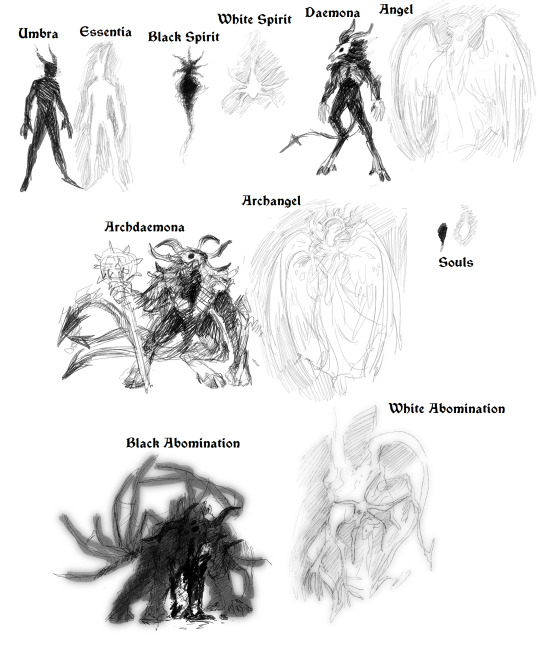
4. Technology & society-wise Divine civilization can be compared to 19th century Earth: imperialism and nationalism are at their peak, proto-industrial society, recently invented trains & electricity. However Divine civilization also possesses traits more associated with our Middle Ages: religion being the most important social institute, no concept of humanism, plate armor & melee weapons still being main tools of war.
5. Like Divine humans themselves Mirabilis looks somewhat Earth-ish but is actually very different. For starters, when I say that DW is a dark and oppressive world I mean it a bit literally! Mirabilis has high atmospheric pressure (~8 higher than Earth), it’s a much colder and wetter planet, and most noticeably — it has no sun. Despite this, Mirabilis still has light and heat, even if not as much as we do, all that thanks to the White Aether (a very important magic substance) that fills the space around the planet. A Sun’s fire isn’t the only kind Mirabilis lacks — due to the low oxygen level of 15% fire simply cannot exist in normal conditions on Mirabilis.
If the word “normal” can even be used towards Mirabilis — all of the planet’s flora are technically mushrooms and much closer to the meat-side of things, so stuff like bleeding human-eating trees isn’t exactly shocking to Divine humans. Animals are technically the same as on Earth but with a huge caveat — their appearance is based on the medieval depictions of them which means animals like hyperagressive fishes with limbs, talking horses with human teeth, owls with human faces, giant non-arthropodic insects and so on.
While Mirabilis is bigger than Earth, it has only one continent that is sliced in half by the so-called Black Wall —an impassable wall of Black Aether. The stories I write take place on the western half of the continent, and its inhabitants can’t just cross the ocean to explore the East because of the atrament — a deadly substance that fills the sea and is so dangerous only two western races out of twelve have any level of resistance to it.
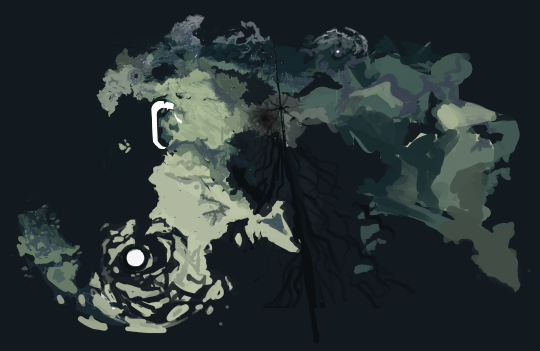
The explorers of Mirabilis would be very upset about this if not for the Remnants, mysterious ruins that are both more ancient than anything they have ever seen yet more advanced than anything they could dream of. Exploring Remnants is an incredibly dangerous, often illegal job, but what’s that compared to a chance to learn more about the world? More materialistic folks are attracted by the artifacts that are capable of granting incredible miracles and, of course, even more incredible horrors.
And I think that’s pretty much it for the introductory post! From now on I’m going to repost the stuff I’ve previously posted on my Twitter before but now with all kinds of lore tidbits. There’s other projects we’ll talk about, especially Neon-23, Marena’s cyberpunk setting (that has a crossover with DW we made for fun!) but that’s it for now. Thank you for reading all this! And thanks to @goldporces & ippoteq @ Twitter for beta-reading this text!
[1] — In Russian I call them Дивнолюди, based on an archaic Russian word for “miracle” — диво. “Divine” is a very lucky translation because it sounds similar to the original word and also points at the, well, divine nature of the Divine Humans.
35 notes
·
View notes
Note
Can you explain this, if society was created to cater to men. Then why in America Black men had to fight tooth and nail for civil rights on paper about 60 years ago?
Feminism feel very classist to me, am I crazy?
First, I'm going to explain society.
Society was never created to cater to men, it was created to help survive the harsh world we came to exist in, then again, that isn't even true due to the fact that society wasn't created, it's a natural evolution of our social dynamics.
Groups of hunter gatherers banded together in the same way Chimps and other apes do, we are a social species who have never existed outside of our societies, even at our most primitive.
We went from wandering nomadic peoples to sedentary villages, towns and cities because we developed agriculture and animal husbandry, now, to protect our tribe from others we would use those in society most today would find abhorrent, the violent and strong men of society.
As we progressed these men came into positions of power because of the protection they could offer, more powerful protectors could allow societies to grow larger and more affluent, while those who couldn't were generally wiped out or were relegated to other roles in society.
The need for strong men is readily apparent, as the old saying goes, hard times created strong men, these strong men create good times.
Strong does not just mean physically strong, these men make easy times because they take responsibility and will make it a point to not only improve their own lives, but that of others. Thus, creating good times in the process
It is those in society, who take the good times as granted and have chosen to abandon responsibility, duty and so on, that create hard times.
The men of the past knew that society was not needed to protect them, but what they cared for, such as women and children, why is this the case?
It is innate for men to lead and be the protectors. It is our most basic biological instinct, this is why men are protective of their loved ones.
And can even be territorial, explaining why we are competitive towards other guys who might threaten our position in our jobs, society and relationships.
Society was built for the betterment of what men love and cherish, to protect what we find precious, the advent of law is a expression of this.
Sorry if I'm rambling.
Now onto your questions.
The reason why black men had to fight tooth and nail 60+ years ago for equal rights was because of Democrats, you see in 1870 the 15th amendment was ratified, which ensured that all men regardless of race could vote.
The right of citizens of the United States to vote shall not be denied or abridged by the United States or by any State on account of race, color, or previous condition of servitude.
Southern Democrat states opposed this and prevented blacks from voting by instituting literacy tests and grandfather laws, then well, Jim Crow, in Northern states blacks could vote since 1870.
It wasn't until 1964 that the 24th amendment was passed and they could vote in Southern and other, now Democrat states.
Feminists, or should I say Suffragists, opposed black women getting the vote alongside them, so due to Democrat racism both black men and women were denied the vote in Democrat areas, especially since these same Suffragists, such as a one Susan B. Anthony and her friends, used black women to work their vinyards.
Feminism is exceedingly classist, and has a history of racism and sexism, along with terrorism, but we won't get into that.
Now to end this with some quotes from the mother of women's suffrage;
“I will cut off this right arm of mine before I will ever work or demand the ballot for the Negro and not the woman,” - Susan B. Anthony
“What words can express her (the white woman’s) humiliation when, at the close of this long conflict, the government which she had served so faithfully held her unworthy of a voice in its councils, while it recognized as the political superiors of all the noble women of the nation the negro men just emerged from slavery, and not only totally illiterate, but also densely ignorant of every public question.” - Susan B. Anthony
“The old anti-slavery school says women must stand back and wait until the negroes shall be recognized. But we say, if you will not give the whole loaf of suffrage to the entire people, give it to the most intelligent first. If intelligence, justice, and morality are to have precedence in the government, let the question of the woman be brought up first and that of the negro last.” - Susan B. Anthony
You're not crazy, Democrats have just never changed.
54 notes
·
View notes